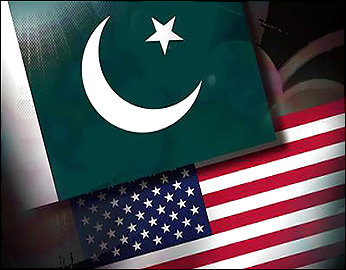 The Dawn Media Group in partnership with WikiLeaks has been releasing the "Pakistan Papers." Thus far, some of the revelations include the following: US was concerned that Pakistan would oppose its policies at the United Nations; US was worried Pakistan would purchase oil from Iran, allowing them to get a foothold in Pakistan; Pakistan's government was upset with US funding for the Pakistan military, which led to increased civil-military tensions; Pakistan's military asked for continued drone coverage; the US has had troops deployed on Pakistan soil; Saudi Arabia and the UAE have been financing jihadist groups in Pakistan and the US did not provide Benazir Bhutto with proper security.
The Dawn Media Group in partnership with WikiLeaks has been releasing the "Pakistan Papers." Thus far, some of the revelations include the following: US was concerned that Pakistan would oppose its policies at the United Nations; US was worried Pakistan would purchase oil from Iran, allowing them to get a foothold in Pakistan; Pakistan's government was upset with US funding for the Pakistan military, which led to increased civil-military tensions; Pakistan's military asked for continued drone coverage; the US has had troops deployed on Pakistan soil; Saudi Arabia and the UAE have been financing jihadist groups in Pakistan and the US did not provide Benazir Bhutto with proper security.
For this episode of "This Week in WikiLeaks," the show has part two of an interview that was done with Raza Rumi, a writer based in Lahore, Pakistan. Rumi regularly writes for the Pakistani weekly The Friday Times, The News and Daily DAWN on myriad topics such as history, arts, literature and society. Rumi has worked in Pakistan and abroad in various organizations including multilateral institutions such as the United Nations.
Rumi's writing can be read here.
[*Note: This is the second part of "This Week in WikiLeaks" for the week. You'll find part one, an interview with Kevin Zeese of the Bradley Manning Support Network on the one year anniversary of Manning's arrest here.]
To hear the show, click play on this embedded player.
 Citizens of the United States today join in celebration of Memorial Day and honor those who have died in American wars from now all the way back to the American Civil War. It is the ninth consecutive Memorial Day during the “war on terrorism,” which was the Bush Administration’s response to the September 11 attacks. The “war on terror,” as the world knows, led to the Afghanistan and Iraq War and countless other covert military operations all aimed at rooting out terrorism.
Citizens of the United States today join in celebration of Memorial Day and honor those who have died in American wars from now all the way back to the American Civil War. It is the ninth consecutive Memorial Day during the “war on terrorism,” which was the Bush Administration’s response to the September 11 attacks. The “war on terror,” as the world knows, led to the Afghanistan and Iraq War and countless other covert military operations all aimed at rooting out terrorism.
The memories of war shared with veterans in communities are, of course, sanitized. Communities do not really tell the stories of war. Members of squads like the “Kill Teams” of Afghanistan do not share photos or cell phone videos they captured when they shot innocent civilians and posed with them. They do not talk about the glory of employing “enhanced interrogation techniques” or torture to gain, often, false information from detainees at Guantanamo or “black” prison sites to better prosecute the war against global terrorism. And probably few could be said to be telling real war stories, like the ones that can be found in the pages of the American literary classic by Tim O'Brien, The Things They Carried.
The situation continues to get worse in Yemen. The US, which has been playing what The Nation’s Jeremy Scahill calls a “ dangerous game,” just days ago urged US citizens to depart Yemen “while commercial transportation is still available.” State Department diplomats have fled the country in the past few days as well.
The acknowledgment of US reaction to the increased violence is not to diminish the struggle of the peaceful revolution in Yemen but to note that the US has used this country as a laboratory for its military experiments in the war on terror and now this is what their "ally" or puppet Ali Abdullah Saleh is doing to the people of Yemen. The lack of US pressure on Saleh to resign has allowed the conflict to escalate.
WL Central is featuring the amazing work of the Yemen Rights Monitor blog that has been tracking the revolution and violence in Yemen since February. We hope you will support their effort to bring the world the truth of what is happening in Yemen and share this widely, especially if you are interested in what is unfolding in Yemen.
Republished with permission from @al_masani and @Ronaldo_Yemen, here’s the latest update.
*
May 29th - Taiz under attack (graphic photos)
French News Agency: Zanjibar in Abyan falls in the hands of Al-Qaeda.
Witness: Armed thugs are gathering in Baghdad St near Dr. Abdulqader Al-Mutawakil Hospital.The humanitairan situation is very bad in Hasaba region, the bombings that took place have made many families suffer. There will be some fundraising events to help them in Yemen, donations are accepted as well.
Armed men in civilian clothes are extensively gathering in Omar Al-Mokhtar School in Sheraton near the U.S Embassy
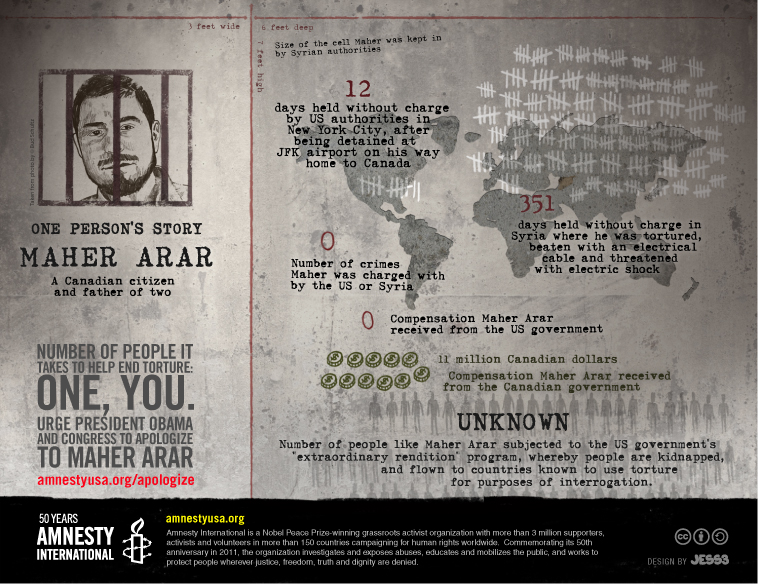
Prism Magazine, founded by Maher Arar, will be broadcasting a livestream discussion on Sunday May 29 at 10:00am EST. Jeff Sallot, an instructor of Journalism at Carleton University and former Globe and Mail Bureau Chief, will host a discussion on the Canadian and American “No-Fly Lists” and their impact on civil liberties. Confirmed guests are Roch Tassé, Ben Wizner and Moazzam Begg.
Moazzam Begg was refused board on a direct Air Canada flight from London to Toronto last week, preventing him from speaking at a Conference on Islamophobia and The Politics of Fear at the Islamic Society of York Region, Toronto Canada, on May 21, as well as two other speaking engagements in Canada.
The livestream will be available at both the following sites:
http://www.livestream.com/prismmagazine
and
http://www.prism-magazine.com/prism-tv/
Infographic credit: JESS3.
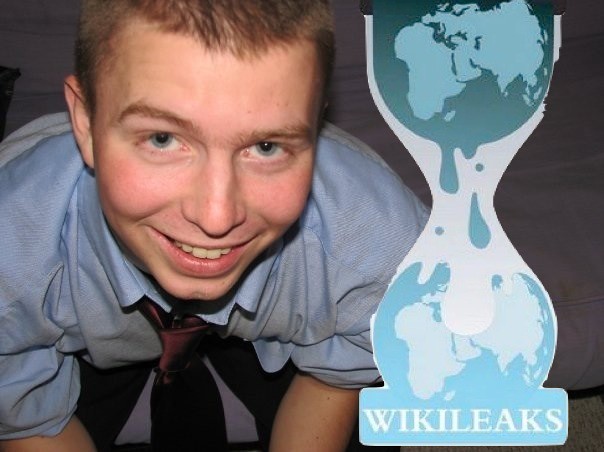 This week the program marks the one year anniversary of Bradley Manning's arrest. Joining the weekly podcast is Kevin Zeese, who is a member of the Bradley Manning Support Network Steering Committee.
This week the program marks the one year anniversary of Bradley Manning's arrest. Joining the weekly podcast is Kevin Zeese, who is a member of the Bradley Manning Support Network Steering Committee.
In the past week, there were two documentaries (or films) that went public, which portrayed Bradley Manning. One was the PBS FRONTLINE documentary (which I had much to say about and even went on RT's "The Alyona Show" to discuss). Another was an investigative short film put together by The Guardian. Zeese addresses both of those.
We also discuss how the Bradley Manning case fits into the general war on whistleblowing that the Obama Administration appears to be waging.
This is Part 1. A Part 2 will be posted soon and features more discussion from Pakistan blogger Raza Rumi on the Pakistan Papers.
To listen to the show, click play on the embedded player below. Or, go to CMN News and click "download" or "listen." It will appear at the top of the page or in the list.
PARTIAL TRANSCRIPT ---
 Three provisions of the Patriot Act set to expire were extended yesterday as Senate leaders effectively shut off debate and worked to block attempts to amend the Patriot Act to include privacy protections. The reauthorized provisions went to the House for approval and, after passing through Congress, the legislation was flown to US President Barack Obama in France so he could sign the reauthorization.
Three provisions of the Patriot Act set to expire were extended yesterday as Senate leaders effectively shut off debate and worked to block attempts to amend the Patriot Act to include privacy protections. The reauthorized provisions went to the House for approval and, after passing through Congress, the legislation was flown to US President Barack Obama in France so he could sign the reauthorization.
The continued granting of overly broad powers, which directly threaten Americans’ right to privacy without unreasonable search or seizure, was accompanied by passage in the House of a National Defense programs bill that included language granting the Executive Branch the authority to wage worldwide war.
A handful of lawmakers in the House and Senate attempted to make amendments or block the passage of measures that would allow powers granted to the state to greatly expand. A trans-partisan group of House representatives introduced an amendment that would have struck down the worldwide war provision. Senator Rand Paul, Senator Mark Udall and Senator Ron Wyden each made valiant attempts to have a comprehensive debate on the provisions before granting reauthorization but the Obama Administration discouraged debate.
 Anyone familiar with the stories of WikiLeaks, Julian Assange, the organization’s founder and Pfc. Bradley Manning, the alleged whistleblower to WikiLeaks, would be forgiven for wondering whether PBS Frontline’s documentary “WikiSecrets” presents anything new or not. The documentary attempts to make a sensational connection between Manning and Assange and suggest that Assange might know Manning is the source of the information.
Anyone familiar with the stories of WikiLeaks, Julian Assange, the organization’s founder and Pfc. Bradley Manning, the alleged whistleblower to WikiLeaks, would be forgiven for wondering whether PBS Frontline’s documentary “WikiSecrets” presents anything new or not. The documentary attempts to make a sensational connection between Manning and Assange and suggest that Assange might know Manning is the source of the information.
The Story
PBS FRONTLINE documentaries are typically straightforward. Thus, the opening montage provides a good idea of what the main points of the documentary will be: it’s hard to tell if Manning approached Assange or whether Assange approached Manning, WikiLeaks had feared one of its “sources” would be exposed, the chat logs suggest Manning knows Assange (but Assange denies that) and WikiLeaks is an anti-secrecy organization that doesn’t believe in secrets, which is why over half a million documents were leaked.
In the first act, FRONTLINE attempts to psychoanalyze Manning and make a determination on his mental health. Sordid details are presented leading one to understand that Manning found himself to be smarter than most of the other soldiers in the military. He was gay and had no respect for “Don’t Ask, Don’t Tell.” He was using Facebook in a way that put him at risk. He was incapable of keeping a steady job. He was a vocal person and had little respect for his commanding officers. And, an army supervisor did not find him to be fit to go to Iraq.
"The only crime in my view, equal to willful inhumanity is the crime of indifference, silence and forgetting."
Dennis Edney, Lawyer For Omar Khadr speaks on Fear, Injustice and his Guantanamo visits in a Conference on Islamophobia and The Politics of Fear at Islamic Society of York Region, Toronto Canada, May 21, 2011. This is the conference that Moazzam Begg was denied permission to board a direct Air Canada flight from London to Toronto to speak at "because of US policy" and the extremely unlikely possibility that the flight may be diverted into US air space.
The following are transcribed excerpts from Dennis Edney's speech.
What we are witnessing is the constant drip of sanity slipping from our grasp as our apathy has allowed whispers of anti-Muslim sentiment to become part of the mainstream on conversation.
On Guantanamo protecting us: We want to protect ourselves from the voice of people like Moazzam Begg.
Updated information from Khadr's legal counsel states that the Supreme Court dismissal this morning related to a years old appeal from Khadr that was actually disallowed last fall by the terms of his plea deal, which ordered "he must dismiss all presently pending action."
“As part of his pre-trial agreement, he had to dismiss his claim against the government,” said his US military defense attorney Lt.-Col. Jackson. “Once the claim was dismissed, and the government accepted the dismissal, they still keep the caption (or heading) of the case as Khadr vs. Obama (as a way to keep the process) consistent, but he’s no longer a plaintiff on that.” Khadr's request for review was bundled with several other requests from other Guantanamo prisoners.
The request for clemency still stands and may be heard this week.
The US Supreme Court denied Guantanamo inmate Omar Khadr's request for clemency today. While a majority voted against granting the petition, Justices Stephen Breyer and Sonia Sotomayor "indicated that they wanted to review the case." Courthouse News opines "Monday's contribution affirms the appearance that the court will defer to the mostly conservative D.C. Circuit on Guantanamo detention matters. The justices have not decided a detainee case in nearly three years."
 Dennis you always say that I have an obligation to show the world what is going on down here and it seems that we've done every thing but the world doesn't get it, so it might work if the world sees the US sentencing a child to life in prison, it might show the world how unfair and sham this process is, and if the world doesn't see all this, to what world am I being released to? A world of hate, unjust and discrimination! I really don't want to live in a life like this. - Omar Khadr in a letter to defense attorney Dennis Edney.
Dennis you always say that I have an obligation to show the world what is going on down here and it seems that we've done every thing but the world doesn't get it, so it might work if the world sees the US sentencing a child to life in prison, it might show the world how unfair and sham this process is, and if the world doesn't see all this, to what world am I being released to? A world of hate, unjust and discrimination! I really don't want to live in a life like this. - Omar Khadr in a letter to defense attorney Dennis Edney.
Omar Khadr was the first child soldier to be charged with a war crime since world war two. The non-existent crime that he was charged with, “murder in violation of the law of war” can be summed up as: It is legal for US soldiers to kill children. It is a war crime for children to kill US soldiers.
After eight years of delays while the US government searched for a possible crime and changed courts and judge, Omar found himself in front of a military tribunal with seven military officers who decided his fate ought to be another forty years of imprisonment. (For a sentence of ten years or more, six of the seven jurors had to agree.) Human Rights Watch said of the fifteen officers selected as potential jurors, All of the 15 indicated that Khadr's age held no significance for the case. ... An Air Force Captain said that in his opinion, a child would need to be as young as five or six to avoid adult courts if accused of a homicide.
The plea deal
 A new batch of US State Embassy cables released specifically dealing with the US relationship with Pakistan draw attention to a number of Pakistani political issues, the military aid the US has been giving Pakistan, the deployment of US troops in Pakistan and the growing conflict between India and Pakistan, which the US appears to be gaming to advance its own foreign policy.
A new batch of US State Embassy cables released specifically dealing with the US relationship with Pakistan draw attention to a number of Pakistani political issues, the military aid the US has been giving Pakistan, the deployment of US troops in Pakistan and the growing conflict between India and Pakistan, which the US appears to be gaming to advance its own foreign policy.
The release is the product of a partnership between the Dawn Media Group and WikiLeaks that began in the last week of April of this year. Around 4,000 cables are to be released over the next few weeks.
There are numerous ways to begin to examine the cables. This post covers the use of drone technology in Pakistan.
Kayani Asks US to Loan Pakistan Unmanned Air Vehicles (UAVs)
The cable getting attention is 08ISLAMABAD609 sent out by Anne W. Patterson on February 11, 2008. It details a meeting between Pakistan General Ashfaq Kayani, Chief of Army Staff, and US CENTCOM Commander and Admiral William J. Fallon on January 22. During the meeting, the two discuss expanding military assistance and training along with improving cooperation in Afghanistan.
Kayani asks Fallon to assist in providing “continuous Predator coverage of the conflict area.” Fallon is unable to offer the “assets to support his request” but offers Joint Tactical Aircraft Controller (JTAC) support for Pakistani aircraft. Kayani does not find this offer politically acceptable.
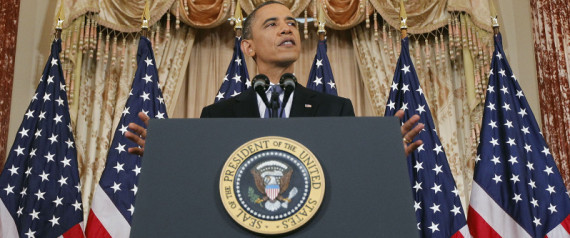 US President Barack Obama delivered a speech at the State Department that described in detail the uprisings in the Middle East and North Africa. He focused on the unfolding transformation in the region and how it was a “moment of opportunity.” And, he called the State Department a “fitting venue to mark a new chapter in American diplomacy.”
US President Barack Obama delivered a speech at the State Department that described in detail the uprisings in the Middle East and North Africa. He focused on the unfolding transformation in the region and how it was a “moment of opportunity.” And, he called the State Department a “fitting venue to mark a new chapter in American diplomacy.”
He called out Syrian leader Bashar al-Assad and the rulers of Bahrain in a roll call of ongoing state repression. He illuminated what he thinks a peace deal between Israel and Palestine should look like at this point in world history and put forth an economic of foreign investment plan. And, he drew attention to the use of technology to fuel the Arab Spring but, despite the fact that Amnesty International hailed WikiLeaks as a catalyst in the Arab Spring, he did not mention WikiLeaks and the organization’s release of previously classified US State Embassy cables.
The core of the speech aims to highlight the value of ordinary citizens sparking movements for change. He says these movements “speak to a longing for freedom that has built up for years.” He explicitly highlights how America came from a history of nonviolence, protest and rebellion against empire.
This focus is deceitful on many levels because individuals who engage in nonviolence and fight against repressive domestic and foreign policies here in the United States (some that have to do with what Obama raised in his speech) can easily be harassed, intimidated and even criminalized for engaging in political activity. US citizens who take too much interest in US foreign policy in countries like Colombia or Palestine risk having their homes raided by the FBI/SWAT and subsequently being subpoenaed to appear before a grand jury.
 "There would be virtually no political blowback domestically for the Conservative Party if the government chooses to pursue an appeal, making this a strong likelihood.”
"There would be virtually no political blowback domestically for the Conservative Party if the government chooses to pursue an appeal, making this a strong likelihood.”
The above statement from US State cable #09OTTAWA629 sums up the last decade of Omar Khadr’s life. The Canadian government, under the last three prime ministers, two Liberal and one Conservative, have done nothing about the plight of a tortured fifteen year old Canadian boy imprisoned with no trial in the world’s most notorious torture camps. They have contributed nothing to his education, nor to his emotional or psychological welfare. They have expressed no concern for his well being. They have not requested his repatriation, nor have they requested that the illegal and amoral conditions of his confinement be improved. (Read a summary of the conditions here.) US State cable 09STATE11937 describes a February 5, 2009 meeting between French Foreign Minister Bernard Kouchner and US Secretary of State Clinton, where the French Foreign Minister requested that the US review his case, but there is no similar suggestion from the country with a legal obligation to defend him.
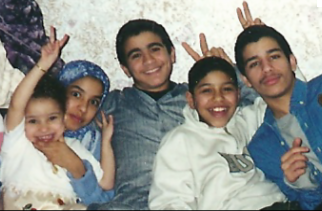 Omar Khadr (centre in the picture at left) was born in Toronto, Canada on September 19, 1986. His father was an Egyptian born Canadian who ran charities to provide food and education for orphans, and was an old friend of Osama Bin Laden. His mother was a Canadian of Palestinian descent. Omar spoke four languages fluently. When he was 15, his family sent him to accompany a group as a translator. The US military identified that group as Al Qaeda.
Omar Khadr (centre in the picture at left) was born in Toronto, Canada on September 19, 1986. His father was an Egyptian born Canadian who ran charities to provide food and education for orphans, and was an old friend of Osama Bin Laden. His mother was a Canadian of Palestinian descent. Omar spoke four languages fluently. When he was 15, his family sent him to accompany a group as a translator. The US military identified that group as Al Qaeda.
In July 2002, US Special Forces attacked the camp where he was staying. When US military entered the site, Omar was buried face down under rubble, blinded by shrapnel and crippled. Another man was beside him. US military documents say a US militant stood on top of Omar's body before realizing that someone was buried beneath. The first US fighter to arrive on the scene shot the man beside Omar dead and then shot Omar twice in the back, leaving two large exit wounds in his chest and chunks of his chest and shoulder ... blown out. He was somehow identified as being the son of his father, either before or after a second US militant prevented the first from shooting him again. He was consequently captured instead.
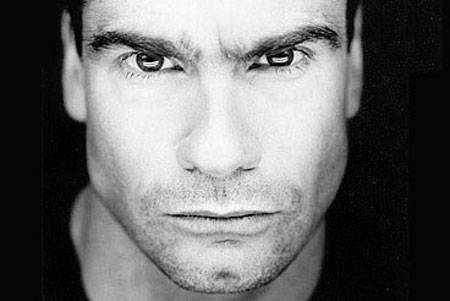 Henry Rollins interview by Maximus D. Estevez and Jonathan "Toth" Getzschman: full text available here. Submitted by Jonathan "Toth" Getzschman.
Henry Rollins interview by Maximus D. Estevez and Jonathan "Toth" Getzschman: full text available here. Submitted by Jonathan "Toth" Getzschman.
"I don’t go to CNN for news like I don’t go to a Burger King for a meal."
Max: In America's search for transparency, new organizations have been formed, such as Wikileaks. America is torn on that specific issue. Some view it as treason. Others view it as patriotism. What is your take on the subject?
Henry: If WikiLeaks is treason, then so was the outing of CIA agent Valerie Plame [VP Dick Cheney called her and her husband "Fair Game" after they proved and announced to the media that Bush was lying about Saddam Hussein's WMD's] and let’s get everyone into court and get it going. If America has so many things that we are not supposed to know about, perhaps it’s time to change the way we do things. The way America conducts itself at this point only seems to lead to new conflicts. If America didn’t go to Iraq, there would be no deficit. Since the American media has been bought and paid for, some people need alternate sources to get their information.
I don’t go to CNN for news like I don’t go to a Burger King for a meal.
Max: In a time when many American's are wanting more transparency in government and to get their voices heard, what do you see as the most honorable and expedient way to get the government to listen to the will of the people?
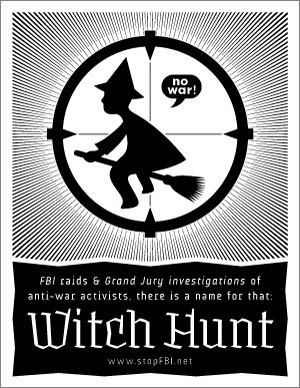 Antiwar and international solidarity activists, subjects of a federal grand jury investigation that alleges they may have provided “material support for terrorism,” uncovered documents on FBI guidelines and investigation practices left behind in an activist’s home that was raided in September of last year. The documents illuminate how the FBI has conducted surveillance of the activists being targeted in the investigation and further prove the grand jury is being used as a tool to go after political groups.
Antiwar and international solidarity activists, subjects of a federal grand jury investigation that alleges they may have provided “material support for terrorism,” uncovered documents on FBI guidelines and investigation practices left behind in an activist’s home that was raided in September of last year. The documents illuminate how the FBI has conducted surveillance of the activists being targeted in the investigation and further prove the grand jury is being used as a tool to go after political groups.
On September 24 of last year, the home of Lindon Gawboy and Mick Kelly, an activist who helped to organize a mass demonstration outside the Republican National Convention in 2008, was raided and subpoenaed. Gawboy was awoken by FBI pounding on her door. She came to the door and asked for a search warrant. The FBI ignored her request for a warrant and proceeded to use a battering ram, which took the door off its hinges and shattered a nearby fish tank.
The agents raiding Gawboy and Kelly’s home emptied file cabinets and desks and stacked files around the apartments. They set up and went through individual documents taking files away that were of interest to them. At some point during this process, an agent’s papers on the investigation became mixed in with Kelly’s files. And, presumably by chance, Gawboy found the revealed documents just weeks ago.
 FROM THE CABLES/GITMO FILES
FROM THE CABLES/GITMO FILES
Dominique Strauss-Kahn may be just one of many diplomats or international officials alleged to have abused maids or nannies in the United States:
In April 2007, a Tanzanian maid filed a lawsuit against Alan Mzengi, a minister-counselor at the Tanzanian Embassy. She alleged the Mzengis kept her as “a virtual prisoner in their residence, stripping her of her passport, refusing to permit her to leave the house unaccompanied.” The lawsuit states she was not paid for her four years of work.
On this case, Reuters reports a US State Embassy cable from December 2009 shows the US government asked the Tanzanian government to investigate saying, “While payment of the lost wages to Ms. Mazengo is our first priority, we also hope that any diplomat who has treated his domestic staff in such an abusive manner would face appropriate sanction upon his return home," the cable said.
The State Department continues to monitor a possible Tanzania investigation and claims it will be getting “tough on alleged abuse of domestic workers by foreign diplomats.”
Cables deal with Canadian electricity:
One story out from CBC reports that Prince Edward Island utility Maritime Electric was part of Hydro-Québec's plans for purchase of NB Power. In October 2009, as the New Brunswick government was considering a $4.8 billion deal that was politically unpopular, the possibility of a sale was denied. The cables show it was seriously considered.
 New US International Cybersecurity Strategy Aims to Institute 'Rule of Law' on the Internet
New US International Cybersecurity Strategy Aims to Institute 'Rule of Law' on the Internet
The United States officially launched its international cyber security strategy in a White House event on Monday, May 16. Secretary of State Hillary Clinton joined by the following administration officials: John Brennan, the president's counterterrorism and homeland security adviser; Howard Schmidt, White House cybersecurity coordinator; Attorney General Eric Holder; Secretaries Janet Napolitano of Homeland Security and Gary Locke of Commerce; and Defense Deputy Secretary William Lynn.
The presentation of the cyber security presented several principles, outlined the approach the US intends to take in the further development of cyber security protections, and indicated how the US might use the Internet to preserve its status as a superpower in the world.
Featured during the presentation were seven principles, which appear in the framework: economic engagement, protecting networks, law enforcement, military cooperation, multi-stakeholder Internet governance, international development and Internet freedom. Within the presentation, Clinton sought to explain that cyber crime, Internet freedom and network security could no longer be “disparate stovepipe discussions.”
At no time during the launch of the strategy was WikiLeaks mentioned. Not even Clinton bothered to mention it, despite the fact that she heads a State Department that had their department’s classified information leaked and published by media organizations and continue to have new information published each day.
 For the past four or five days, a copy of a leaked confidentiality agreement from WikiLeaks has been a hot topic among those who follow news and politics. Those that have regularly scrutinized WikiLeaks, who have typically gone along with any meme in the media that shines a light on the organization’s imperfections, took the posting of this agreement as an opportunity to focus on how this showed complete hypocrisy. Those sympathetic and supportive, on the other hand, saw this as a moment when they needed to get out in front and defend the organization.
For the past four or five days, a copy of a leaked confidentiality agreement from WikiLeaks has been a hot topic among those who follow news and politics. Those that have regularly scrutinized WikiLeaks, who have typically gone along with any meme in the media that shines a light on the organization’s imperfections, took the posting of this agreement as an opportunity to focus on how this showed complete hypocrisy. Those sympathetic and supportive, on the other hand, saw this as a moment when they needed to get out in front and defend the organization.
I was one of those people who found the renewed push to further de-legitimize WikiLeaks concerning. I posted an analysis of the confidentiality agreement and later posted a comprehensive and thought-out critique of David Allen Green's work on WikiLeaks. (Green is the blogger for the New Statesman, who helped make the agreement a big story.)
As the story was breaking, I received a Twitter message, “WikiLeaks Threatens Its Own Leakers With $20 Million Penalty" http://bit.ly/klgAnz What says @kgosztola?” The message came from Roni Weiss, a personality on a podcast show called “Don’t Worry About the Government.” I told him he should have me on his program to share my opinion.
On Facebook, we went back and forth on the “Don’t Worry About the Government” show page as I tried to get him to do a segment with me. He stated his position, “My biggest concern is that I just don't have much to say about it…My stance is basically: This looks bad for them, publicity-wise, and beyond that, I don't really care, because they do a lot of things that look bad.
 BBC’s report on US State Embassy cables from WikiLeaks detailing the “hidden agenda” of northern Arctic states has led Greenpeace to call “on the Arctic Council to place an immediate moratorium on industrial exploitation within the area that has historically been covered by sea ice.”
BBC’s report on US State Embassy cables from WikiLeaks detailing the “hidden agenda” of northern Arctic states has led Greenpeace to call “on the Arctic Council to place an immediate moratorium on industrial exploitation within the area that has historically been covered by sea ice.”
Truls Gulowsen, Arctic campaign leader for Greenpeace Nordic, writes, “What the Arctic needs in this time of extreme external pressure is a protection against additional threats from dangerous shipping, oil exploitation, bottom-trawling, over-fishing and other destructive industrial practices.” Gulowsen also points out the “more immediate and more dangerous safety issue” is that moves into the “fragile Arctic to drill for oil” will create a threat of oil spills and likely impact the marine environment.
The Financial Times post on the cables highlights some of the noteworthy revelations in the cables:
Theme by Danetsoft and Danang Probo Sayekti inspired by Maksimer